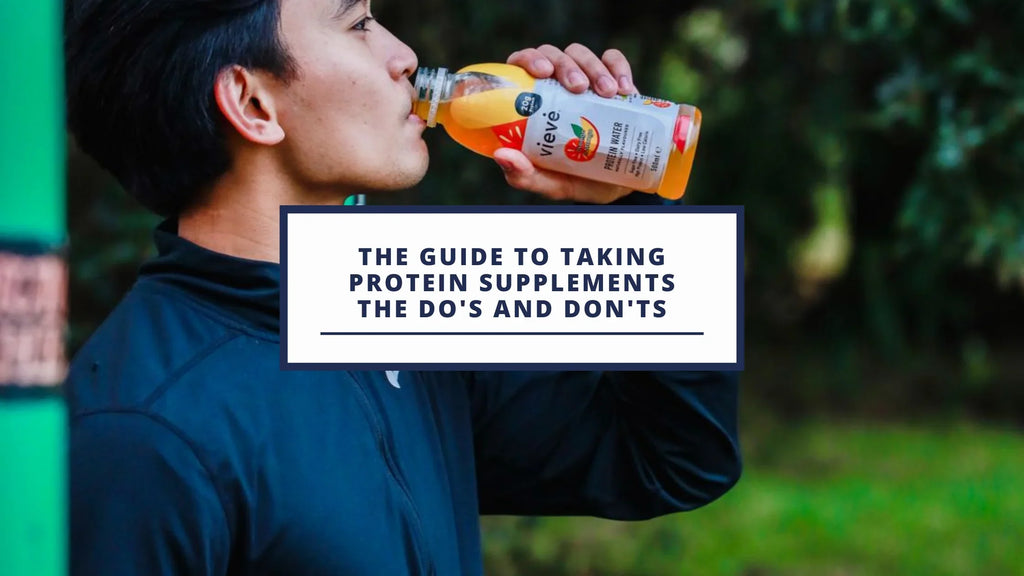A Guide to Taking Protein Supplements - The Do's and Don'ts

A guide to taking protein supplements
Fad or no brainer? Protein supplements have become more and more mainstream but are they really for everyone? Dietitian for Vieve Protein Water, Dr Carrie Ruxton (www.nutrition-communications.com), gives the low down on protein supplements and helps cut through the confusion.
Protein is all the rage and, like many others, my teenage son is obsessed with glugging down 160g of the stuff daily, normally in faffy powder form or thick milky liquid protein drink or shake. But what does the science say about this essential nutrient and who should be taking supplements?
Why do we need the stuff?
Imagine a world without protein … no amino acid building blocks to give our muscles and bones substance, no anti-bodies to fight viruses, no hormones to send messages around the body, no oxygen transported in blood. In fact, protein is involved in a huge array of processes which help our body to function correctly.
The science is so strong that the European Union has authorised the following health claims for protein:
- ‘Contributes to a growth in muscle mass’, i.e. body building, toning
- ‘Contributes to the maintenance of muscle mass’
- ‘Contributes to the maintenance of normal bones’.
So, how much do we need?
The answer depends on your exercise levels. A typical couch potato needs 45-55g of protein daily but actually eats 65-85g, mostly as meat and dairy foods. However, someone taking regular exercise needs a lot more as the table below shows[1]. As it can be difficult to work around training and a busy lifestyle, protein supplements are a useful addition to the diet.
|
|
Daily needs |
Advice around exercise |
Other advice |
|
Sedentary population |
Males 55.5g Females 45g |
Please do some! 30 minutes brisk walking a day is a good start |
Eat protein 2-3 times daily |
|
Resistance exercise e.g. Crossfit, HIT, active yoga, weight training |
1.2 to 1.7g per kg body weight (i.e. 85-120g daily for a 70kg person) |
Around 20g protein immediately after exercise |
Choose protein of high biological value such as meat, eggs, dairy, fish, soy, collagen peptides or whey |
|
Endurance exercise e.g. Nordic walking, running, cycling |
1.2 to 1.4g per kg body weight (i.e. 85-100g daily for a 70g person) |
15-20g after exercise plus carbohydrate-rich foods or drinks to replace glycogen stores |
Types of protein
Proteins are complex structures made up of tiny chains of amino acids. There are 20 types of amino acids and nine of these are essential – we don’t make them in our bodies. A good source of protein is one that contains most or all of the essential amino acids. We call these high biological value proteins. Good natural examples are lean meat, eggs, fish and milk. Examples of protein ingredients in supplements are collagen peptides (made from gelatin) and whey (made from milk).
While the diet should be based on real foods, as these contain a range of vitamins, minerals and dietary fibres, protein supplements can help active people reach their recommended intake and are a convenient portable source of protein.
Who should take supplements?
Studies show that protein supplements have their optimal effect when combined with regular exercise.
A review published in Sports Medicine[2] in 2015 examined the results from 38 clinical studies and found that muscle size and strength were boosted by protein supplements when the individuals trained regularly and for a set amount of time each week. Protein supplementation also led to faster gains in both aerobic (endurance) and anaerobic (sprinting, dynamic) power.
In contrast, protein supplements had no effect on untrained people, or in the first couple of weeks of beginning exercise. So, extra protein needs the stimulus of regular training before you see a change in muscle size, function and aerobic power.
The American College of Sports Medicine[3] recommends that people starting out on a new exercise programme should train two to three times a week. Those more experienced should aim for three to four times a week, alternating between the major muscle groups (arms, chest, shoulders, legs). Taking a holistic approach, e.g. yoga, high intensity training (HIT) and Crossfit is also great.
Good timing
Given that protein works best when spread out across the day and combined with carbs, it’s a good idea to eat some protein at every meal and use protein supplements after exercise, or when you’re on the move. A typical day for an active person could be as follows:
Breakfast: 2-3 egg omelette plus Greek-style yogurt or Skyr with berries and honey, hot drink
Snack: handful of almonds, water or tea
Lunch: Chicken salad or sandwich, piece of fruit, large glass of low fat milk
Post-training: Protein drink with a banana
Evening meal: Pork and vegetable stirfry with brown rice; rice pudding for dessert, herbal tea (ginger or rooibos is anti-inflammatory)
Bedtime snack: Bowl of low sugar granola with milk, or a couple of slices of wholemeal toast with peanut butter.
Why Should You Choose Vieve Protein Water & Powders?
Still looking for a clear protein supplement and a hydrating protein drink to fit into your routine? Vieve is a hydrolysed clear collagen protein drink, with 20g protein and zero sugar or dairy. Head over to our shop to check out our selection of protein waters here. Find out more about Vieve here.
Also have you tried our new collagen powder? Simply add a tablespoon to get an instant 13g protein boost! Mix it into your favourite food and drinks without impacting the taste, while getting a pure hydrolysed collagen peptide boost. With zero fat, sugar or dairy its easiest way to get your protein boost without impacting your macros. Plus it comes in 100% recyclable packaging and is 100% sourced from EU, grass-fed, pasture-raised cattle.
Vieve Protein Water is available in the UK from Amazon, Ocado, WH Smith or Holland & Barrett.
About Dr. Carrie Ruxton:
Carrie Ruxton is a registered dietitian with more than 25 years’ experience in nutrition and health.
Since 2003, she has headed a consultancy, Nutrition Communications, which offers nutrition and communications advice to food and beverage companies, and trade bodies. Formerly, Carrie worked as an academic, hospital dietitian and industry nutritionist.
Carrie publishes widely in scientific journals, textbooks and magazines, as well as writing audits and strategies for the public sector. She has won three awards for her writing, including the British Dietetic Association’s Elizabeth Washington Award. From 2007-2015, she served on the Scottish Food Advisory Committee.
Carrie is a regular contributor to national newspapers, magazines, radio and TV. In recent months, she has appeared on Food Unwrapped, Rip Off Britain and Sunday Morning Live as well, as more recently, BBC Two’s Food Detectives.
References:
[1] Ruxton C & Cobb R (2015) Benefits of protein for sport and exercise. Complete Nutrition 15(5): 50-52.
[2] www.ncbi.nlm.nih.gov/pubmed/25169440
[3] www.livestrong.com/article/438477-how-often-should-i-lift-weights-per-week/
